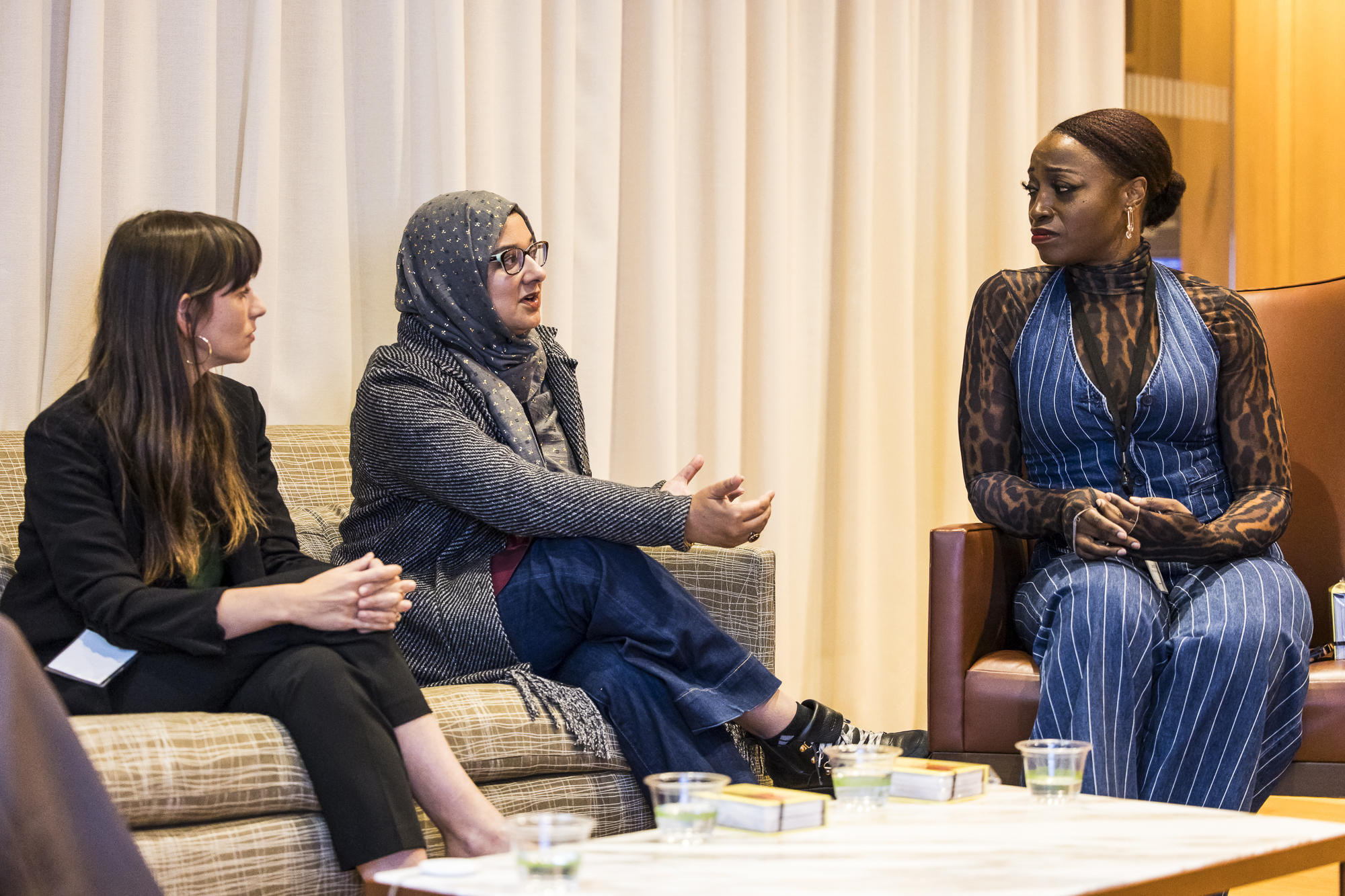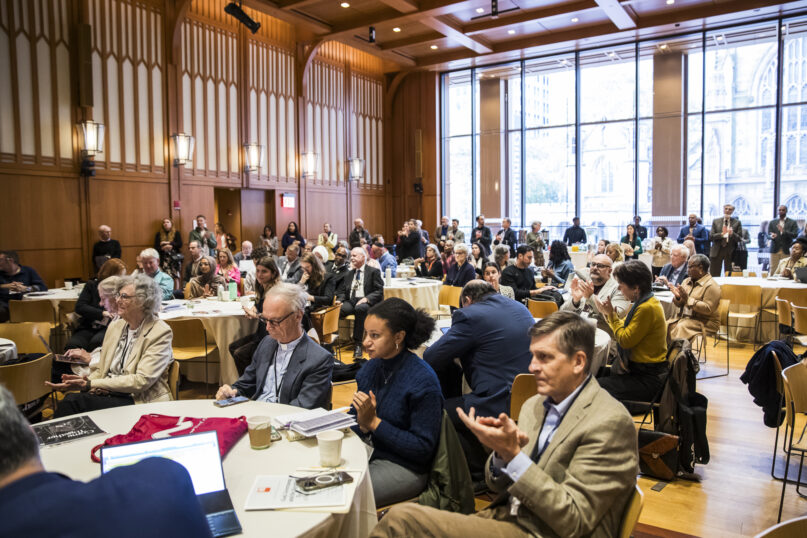
(RNS) — Faith in America endures, but it is being tested — by technology, division and the erosion of trust.
That was the consensus running through Religion News Service’s recent all-day symposium at Trinity Church NYC in Manhattan.
Rather than offering simple answers, the day explored tensions that define religion in 2025: faith as both connective tissue and fault line, as comfort and confrontation. Here are a few of the central truths that emerged from the program.
1. Technology preaches its own gospel.
Again and again, speakers warned that technology has moved beyond influence to ideology. Algorithms decide what people see, whom they trust and even what they worship. Princeton scholar Eddie Glaude Jr. described a push toward “performative virtue” — a culture of moral display detached from lived values.
Harvard University and Massachusetts Institute of Technology Humanist Chaplain Greg Epstein went further, comparing the growth of artificial intelligence to the spread of Christianity under Emperor Constantine. AI, he argued, functions like a doctrine complete with its own priests, rituals and end-times mythologies.
The question, then, is whether humanity can still claim moral authority over the technology it has built — or whether we will kneel before it. “There’s an order to this relationship,” said Catholic University Executive Vice President . “The human is made in the image of God, and the machine is a tool.”

Attendees of the 2025 RNS symposium at Trinity Church NYC, Wednesday, Oct. 22, 2025, in New York City. (RNS photo/Kisha Bari)
2. Disillusionment runs deep.
Many speakers described a season of vitriol and broken trust. Latino evangelicals feel betrayed by both major political parties. Humanitarian groups have seen long-standing federal partnerships abruptly dissolved. Religious leaders have seen their most sacred beliefs co-opted to justify actions to which they are morally opposed. Elected leaders have modeled what one panelist called “uncivil discourse” — a practice that encourages constituents to act the same way.
The result is a kind of civic souring. Trust has curdled into suspicion and fear, and even small disagreements feel radioactive. What used to be debate now feels like disdain.
According to the day’s speakers, this disillusionment is supercharged by technology that keeps us sequestered; sorted among those who share our beliefs and encourage our biases. “If you choose to be narrow in how you orient yourself, now we have technology that affirms the choice to be blinkered and narrow and parochial in our views,” said Glaude.
3. We must remember our shared humanity.
If we are increasingly dehumanized, our most urgent moral act is to recognize our connection to one another. That conviction came alive in the afternoon’s most emotional session, when the Rev. Eric Manning of Mother Emanuel AME Church and Rabbi Hazzan Jeffrey Myers of Pittsburgh’s Tree of Life synagogue spoke about the friendship they built after both their houses of worship were attacked by gunmen who murdered congregants.
Manning said he reached out and traveled to sit with Myers in the aftermath of the Tree of Life shooting simply because he knew what it meant to lead a congregation through horror. Myers called Manning’s act of showing up “the ministry of presence.” Together, they have since sought to model the kindness and empathy missing from national discourse. “It’s genuine love,” said Manning. “It’s empathy for another person who is created in the image of God.”
Their conversation turned the day’s abstract debates into something concrete: a reminder that moral repair begins by seeing one another as people.

Rabbi Hazzan Jeffrey Myers, right and the Rev. Eric Manning, center, at Trinity Church NYC, Wednesday, Oct. 22, 2025, in New York City. (RNS photo/Kisha Bari)
4. There is hope for change.
Despite fatigue, nearly every panelist insisted they saw reasons for hope.
When it comes to artificial intelligence, former co-editor of AI and Faith Haley Griese reminded listeners that technology could be used for good. “It’s about the application,” she said, “and political and moral pressure on our institutions to support AI that supports human life and flourishing.”
Other speakers noted that people have become more determined to do good in the face of rising obstacles. HIAS Executive Director Mark Hetfield, for example, said that challenges to refugee resettlement have only energized donors in the Jewish community. “When I started at HIAS, the biggest problem was apathy,” he said. “We now have congregations and individuals more engaged than they have been in decades.”
Speakers described hope not as blind optimism, but as work: rebuilding relationships, demanding accountability and taking real steps to make change. “I’m not OK,” Glaude admitted, recalling years of racial reckoning and pandemic loss. “But I come from a blues people, and what you do is you swing your feet off the bed, plant them on the floor and get up.”
5. Faith can lead.
Whether through refugee resettlement, food security or honest moral conversation, speakers noted that faith communities remain among the few spaces where people practice empathy across difference.
“As religious leaders, we can come together and reason together and coalesce around one idea,” said Pastor Tony Suárez, a leader in the National Hispanic Christian Leadership Conference, “even understanding we might disagree on 10 other issues.”
At the same time, faith can promote determination and resilience in the face of obstacles — giving faith leaders and communities the strength to weather difficult moments and environments. “People of faith don’t stop working because these things happen,” said Institutional Religious Freedom Alliance Founder Stanley Carlson-Thies.
That sentiment was poignantly captured by Myers, who called on faith leaders to continue seeking light over darkness.
“The majority of humanity is good,” said Myers. “We never get to see the majority of humanity, because the interesting part of reporting is always the ugly, dirty side of America. The good stuff you never get to see. We know there’s good out there — and we’re the ones who go look for it.”
